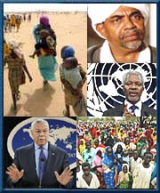Sudan at crossroads as Darfur war rages
CAIRO, Dec 20 (AFP) — Sudan was thrown into the international limelight in 2004, with an ongoing conflict in the western Darfur region sparking a devastating humanitarian crisis but fresh hope of an imminent settlement in the south that would end Africa’s longest-running civil war.
 Negotiations in Nigeria between the two main Darfur rebel groups and the government have floundered in December, with each side blaming the other for ongoing violence.
Negotiations in Nigeria between the two main Darfur rebel groups and the government have floundered in December, with each side blaming the other for ongoing violence.
The main issues being discussed at the African Union-sponsored talks are the disarming of the pro-government Arab militias who are accused of committing atrocities against civilians and regrouping of rebels in camps demanded by Khartoum.
The rebels have also requested Darfur’s natural wealth — which is thought to include large oil, copper and uranium resources — be fairly distributed, in a bid to end the marginalisation that sparked the rebellion in February 2003.
Khartoum is still threatened with international sanctions over its failure to rein in its proxy militias — known as Janjaweed — and the UN Security Council renewed its warning during a special meeting in Nairobi last month.
A period of relative calm which followed the signing of a ceasefire in Chad in April gradually deteriorated into a full-fledged guerrilla war later this year.
The African Union mission that was dispatched to the region to monitor the ceasefire has even reported a surge in the number of truce violations in recent months.
On December 18, the Sudanese government was still engaged in a broad offensive, violating a deadline set by the African Union to stop its operations and threatening to dash weeks of efforts to reach a compromise.
The African Union force, whose performance is a first real test of the pan-African body’s efficiency, has so far failed to contain the violence and provide protection for civilians who have borne the brunt of the fighting.
Observers have said that its deployment is too slow, its work impeded, its recommendations unheeded and that it needs broader political support.
Humanitarian organisations bent on alleviating the suffering of an estimated 1.65 million displaced people have also been targeted, forcing them to flee the area and abandon starving civilians to their plight.
Although no accurate figures are available, the UN said in October that 70,000 people had died in Darfur over a period of six months from disease and malnutrition alone.
Commentators and belligerent parties hope however that growing chances of a peace agreement in the south will snowball to Darfur and yield a peace agreement.
Final negotiations between southern rebel leader John Garang and Sudanese Vice President Ali Osman Taha have resumed in Kenya and some reports say the two men could hatch a comprehensive peace agreement by the end of the year.
Such a deal would put an end to a civil war which started in 1983 — making it one of the longest-running guerrilla conflicts on the planet — and has left 1.5 million dead and another four million displaced.
The draft agreement the two parties have reached so far provides for an interim period of six years, after which the mainly Christian and animist southerners will be given an opportunity to decide whether they want to remain a part of Sudan or secede.
As he simultaneously tried to fend off international pressure and deal with the crises in Darfur and in the south, Sudanese President Omar al-Beshir has also had to cosy up to the political opposition in a bid to consolidate his fragile regime.
As he attempts to bolster his position for tough negotiations that could revamp the national political landscape, Beshir has worked on a rapprochement with the country’s two main parties, whose activities he froze after seizing power in 1989.
